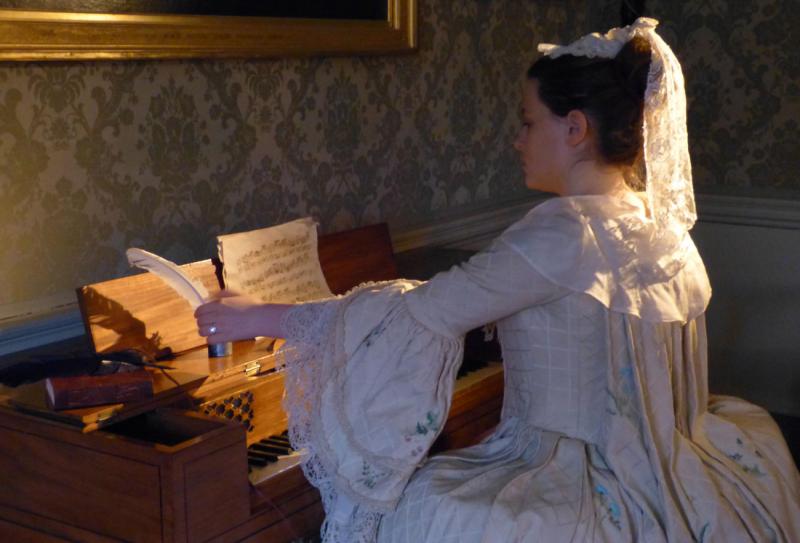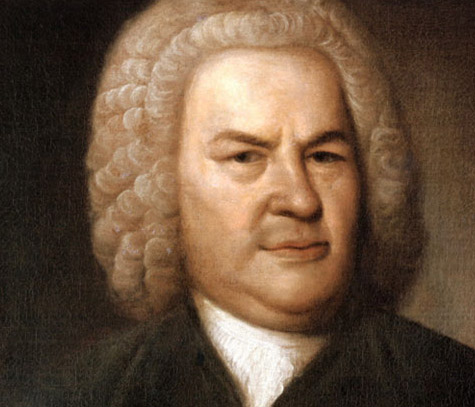Written By Mrs Bach, BBC Four | reviews, news & interviews
Written By Mrs Bach, BBC Four
Written By Mrs Bach, BBC Four
Did Anna Magdalena compose some of her husband's best-loved masterpieces?

The Australian musician and musicologist Martin Jarvis, connected with Charles Darwin University in the Northern Territory, has been obsessed for the past 25 years with proving that Anna Magdalena Wilcke, Johann Sebastian Bach’s second wife, was not only muse, inspiration, and copyist but a composer of pieces that now bear her husband’s name.
Jarvis enlisted the professional help of a forensic graphologist, the American academic Heidi Harralson, to examine scores and signatures. Visits were made to Harvard University, Weimar, Leipzig, Cöthen and Karlsbad, speculating all the way with occasional demonstrations of computer analyses of signatures and music scores. To show that he had travelled far from Oz in his quest, the professor was seen walking quickly down various streets in various cities trundling his carry-on roller bag.
The participants may have enjoyed their investigatory travels, but for the viewer it was a free ride to nowhere
The whole was commented upon by the distinguished Scottish composer Sally Beamish. Ms Beamish was perhaps chosen because of the fashionable and understandable attempts to find behind every creative man a creative woman, to perhaps indeed rewrite (as she breathlessly asserted) the whole history of music. There were occasional musical intervals by an Australian musician, a lady with a lot of hair whose name this reviewer never caught, who played Bach on a harpsichord improbably sited on a terrace at the dramatic seaside Sydney Opera House, overlooking the rippling waters of the bay.
We were told that Bach (or whoever) composed all his finest work after his second marriage; that Anna Magdalena bore 13 children, of whom only six survived into adulthood; that her eldest stepdaughter was only five years younger than her stepmother, and therefore must have detested Anna Magdalena, who was buried as a mendicant widow in an unmarked grave in Leipzig. Johann Sebastian's adult musician sons had deserted their stepmother after Bach’s death, and it was one of those musicians, Carl Philip Emanuel, who spun his father’s life story to Bach’s first biographer, 50 years later.
These rather random facts popped up from time to time in a narrative that attempted to appear purposeful but was a curious meander with no solid core. Evidence as to who did what was not convincing, and did not seem to matter all that much as musicians of the period were jacks – or jills – of all trades in the world of music, from composing to playing to conducting.
Nor was any back story offered as to why Martin Jarvis was himself so concerned with attempting to ferret out Anna Magdalena’s story, to the point of prurient speculation as to whether before their marriage Anna Magdalena and Bach had had an affair in the fashionable spa town of Karlsbad. This was the cue for scenes of 21st-century end-of-festival parties to show what jolly japes there were. However, Jarvis did tell us his father was a senior Welsh policeman, and sleuthing was in his genes (the party-going JS Bach, pictured below).
 There were glimpses of lush Australian landscape to show Jarvis’s habitat, and a flutter of some Bach being played by some Australian musicians rather improbably in an art gallery hung with bland abstract paintings, haphazardly conducted by Jarvis (to show his musicianly credentials no doubt). As punctuation, there were glimpses of the mute Anna Magdalena penning her compositions – left handed – while being driven through the countryside in a coach, gazing soulfully at nothing in particular, tiny tableaux which were there for atmosphere but served only to irritate.
There were glimpses of lush Australian landscape to show Jarvis’s habitat, and a flutter of some Bach being played by some Australian musicians rather improbably in an art gallery hung with bland abstract paintings, haphazardly conducted by Jarvis (to show his musicianly credentials no doubt). As punctuation, there were glimpses of the mute Anna Magdalena penning her compositions – left handed – while being driven through the countryside in a coach, gazing soulfully at nothing in particular, tiny tableaux which were there for atmosphere but served only to irritate.
Rather than illuminating the world of music in the 18th century in general and Bach’s career in particular, let alone Anna Magdalena’s, the film neither arrived at any further understanding, nor any firm conclusions. The participants in this programme may have enjoyed their investigatory travels across the world, but for the viewer it was a free ride to nowhere.
Add comment
The future of Arts Journalism
You can stop theartsdesk.com closing!
We urgently need financing to survive. Our fundraising drive has thus far raised £49,000 but we need to reach £100,000 or we will be forced to close. Please contribute here: https://gofund.me/c3f6033d
And if you can forward this information to anyone who might assist, we’d be grateful.

Subscribe to theartsdesk.com
Thank you for continuing to read our work on theartsdesk.com. For unlimited access to every article in its entirety, including our archive of more than 15,000 pieces, we're asking for £5 per month or £40 per year. We feel it's a very good deal, and hope you do too.
To take a subscription now simply click here.
And if you're looking for that extra gift for a friend or family member, why not treat them to a theartsdesk.com gift subscription?
more TV
 The Count of Monte Cristo, U&Drama review - silly telly for the silly season
Umpteenth incarnation of the Alexandre Dumas novel is no better than it should be
The Count of Monte Cristo, U&Drama review - silly telly for the silly season
Umpteenth incarnation of the Alexandre Dumas novel is no better than it should be
 The Narrow Road to the Deep North, BBC One review - love, death and hell on the Burma railway
Richard Flanagan's prize-winning novel becomes a gruelling TV series
The Narrow Road to the Deep North, BBC One review - love, death and hell on the Burma railway
Richard Flanagan's prize-winning novel becomes a gruelling TV series
 The Waterfront, Netflix review - fish, drugs and rock'n'roll
Kevin Williamson's Carolinas crime saga makes addictive viewing
The Waterfront, Netflix review - fish, drugs and rock'n'roll
Kevin Williamson's Carolinas crime saga makes addictive viewing
 theartsdesk Q&A: writer and actor Mark Gatiss on 'Bookish'
The multi-talented performer ponders storytelling, crime and retiring to run a bookshop
theartsdesk Q&A: writer and actor Mark Gatiss on 'Bookish'
The multi-talented performer ponders storytelling, crime and retiring to run a bookshop
 Ballard, Prime Video review - there's something rotten in the LAPD
Persuasive dramatisation of Michael Connelly's female detective
Ballard, Prime Video review - there's something rotten in the LAPD
Persuasive dramatisation of Michael Connelly's female detective
 Bookish, U&Alibi review - sleuthing and skulduggery in a bomb-battered London
Mark Gatiss's crime drama mixes period atmosphere with crafty clues
Bookish, U&Alibi review - sleuthing and skulduggery in a bomb-battered London
Mark Gatiss's crime drama mixes period atmosphere with crafty clues
 Too Much, Netflix - a romcom that's oversexed, and over here
Lena Dunham's new series presents an England it's often hard to recognise
Too Much, Netflix - a romcom that's oversexed, and over here
Lena Dunham's new series presents an England it's often hard to recognise
 Insomnia, Channel 5 review - a chronicle of deaths foretold
Sarah Pinborough's psychological thriller is cluttered but compelling
Insomnia, Channel 5 review - a chronicle of deaths foretold
Sarah Pinborough's psychological thriller is cluttered but compelling
 Live Aid at 40: When Rock'n'Roll Took on the World, BBC Two review - how Bob Geldof led pop's battle against Ethiopian famine
When wackily-dressed pop stars banded together to give a little help to the helpless
Live Aid at 40: When Rock'n'Roll Took on the World, BBC Two review - how Bob Geldof led pop's battle against Ethiopian famine
When wackily-dressed pop stars banded together to give a little help to the helpless
 Hill, Sky Documentaries review - how Damon Hill battled his demons
Alex Holmes's film is both documentary and psychological portrait
Hill, Sky Documentaries review - how Damon Hill battled his demons
Alex Holmes's film is both documentary and psychological portrait
 Outrageous, U&Drama review - skilfully-executed depiction of the notorious Mitford sisters
A crack cast, clever script and smart direction serve this story well
Outrageous, U&Drama review - skilfully-executed depiction of the notorious Mitford sisters
A crack cast, clever script and smart direction serve this story well
 Prost, BBC 4 review - life and times of the driver they called 'The Professor'
Alain Prost liked being world champion so much he did it four times
Prost, BBC 4 review - life and times of the driver they called 'The Professor'
Alain Prost liked being world champion so much he did it four times

Comments
Surely some research was done
I have not had the
Professor Jarvis's work has
I have no difficulty with the